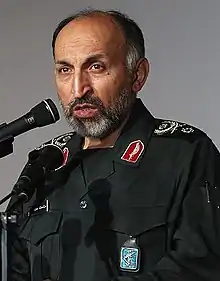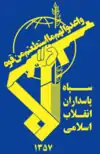Mohammad Hejazi
Mohammad Hossein-Zadeh Hejazi (Persian: محمد حسینزاده حجازی, born 1956 in Isfahan, Iran) is a military commander in Iran's Islamic Revolutionary Guard Corps.
- This article refers to the commander of Basij; for the author, see Mohammad Hejazi (author)

Early life and education
Hejazi was born in Isfahan in 1956.[1] He attended the University of Tehran.[1]
Career
Hejazi became a member of the Islamic Revolutionary Guard Corps in May 1979.[1] He served as the intelligence and security advisor to the Supreme Leader Ali Khamenei.[2] He is a former commander of Basij, the auxiliary Iranian paramilitary branch of the Islamic Revolutionary Guards Corps.[3] Since January 20, 2020, he is the Deputy Commander of the Quds Force, by decree of the Supreme Leader, Ali Khamenei.
Allegations
It is alleged by the American Jewish Committee that Hejazi, while serving as an advisor to Khamanei, attended a meeting in August 1993 to plan the AMIA bombing in Argentina along with Khamanei, Rafsanjani, then president, Ali Fallahian, then intelligence minister, and Ali Akbar Velayati, then foreign minister.[2]
The subject was the deputy commander of the Islamic Revolutionary Guard Corps in 2008 and the commander of Terhan's Tharallah military base whose units were central to the government efforts to combat the 2009 Iranian presidential election protests.[4]
On August 29 2019, the Israeli military launched a Twitter campaign claiming to 'expose' Hejazi, along with IRGC colonel Majid Nuab and brigadier general Ali Asrar Nuruzi, and his role in a "secret project with Hezbollah to manufacture precision guided missiles to attack Israel", and saying that it was "not so secret anymore".[5] This "exposing" of Hejazi was ridiculed as both Iran and Hezbollah have publicly stated that Iran has supplied precision guided missiles to Hezbollah, with Hezbollah's Secretary-General Hassan Nasrallah directly priding over the fact in a televised address to Benjamin Netanyahu for over a year.[6][7]
References
- Muhammad Sahimi (11 August 2012). "The IRGC Strategic Brain Trust". PBS. Retrieved 18 May 2016.
- Barsky, Yehudit (May 2003). "Hizballah" (PDF). The American Jewish Committee. Archived from the original (Terrorism Briefing) on 29 October 2013. Retrieved 5 August 2013.
- "Iran President Writes to American People". The Washington Post. 29 November 2006. Retrieved 25 February 2011.
- Yaghoub Fazeli. (20 January 2020). "Iran’s IRGC appoints new Quds Force deputy commander". Al Arabiya website Retrieved 3 February 2020.
- "Retweets for intel? IDF unnerves Twitter with 'Terrorist Guess Who' game". RT. 29 August 2019.
- "Hizbullah Leader Nasrallah: We Have Accurate Missiles, Despite Israel's Attempt to Thwart Delivery" on YouTube
- "Hassan Nasrallah: We Have Enough Missiles to Send Israel Back to the Stone Age" on YouTube
| Military offices | ||
|---|---|---|
| Preceded by Alireza Afshar |
Commander of the Basij Mobilisation Force 1998–2007 |
Succeeded by Hossein Taeb |
| Preceded by Ali-Akbar Ahmadian |
Chairman of the Joint Staff of the Revolutionary Guards 2007–2008 |
Staff disestablished |
| Preceded by himself as Chairman of the Joint Staff |
Vice Commander of the Revolutionary Guards for Coordination 2008 |
Succeeded by Jamaladdin Aberoumand |
| Preceded by Morteza Rezaee |
Second-in-Command of the Revolutionary Guards 2008–2009 |
Succeeded by Hossein Salami |
| Preceded by Mohammad Reza Naqdi |
Vice Chief of the General Staff of Iranian Armed Forces for Readiness, Logistics and Industrial Research 2009–2014 |
Succeeded by Ali Abdollahi |
| Preceded by Esmail Ghaani |
Second-in-Command of the Quds Force 2020–present |
Incumbent |
